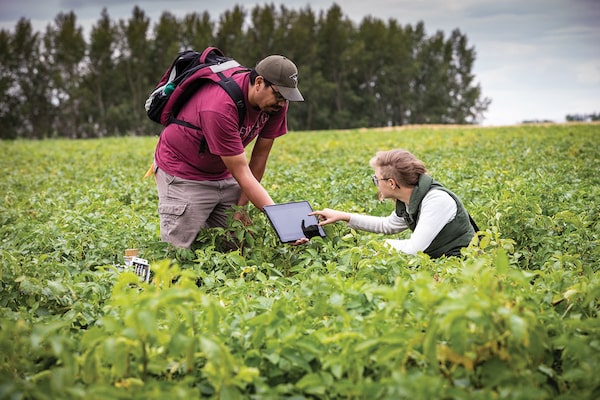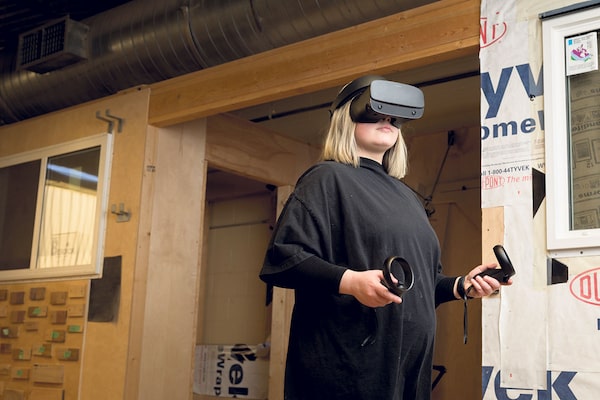
With a new Centre of Excellence in People Development, Lethbridge College is increasing its efforts to support economic recovery by providing flexible learning options that allow businesses to thrive and employees to join or re-enter the labour market.SUPPLIED
The COVID-19 pandemic and downturn in the oil and gas industry have taken a toll on Alberta’s economy. Now the province’s post-secondary educators are working to build a workforce that can support its economic recovery.
Lethbridge College has stepped up to do this through a new Centre of Excellence in People Development, which provides flexible learning options that allow businesses in the southwest region to thrive and employees to join or re-enter the labour market in careers that match their passions and strengths.
“It’s about building skills for jobs,” says Kenny Corscadden, the college’s associate vice-president of research, innovation and entrepreneurship. The new centre will identify and meet the needs of employers by offering micro-credentials and badges that upskill and reskill employees, he explains. “Our goal is to get students ready for work.”
A recent regional skills study highlighted the need for local municipalities, businesses, economic development organizations and post-secondary institutions to work together on skills and labour-market development to support economic growth.
“We play a key role in training the employees who support our local job market,” says Paula Burns, president and CEO of Lethbridge College. The study identified a strong labour force as the top consideration for businesses looking to invest in the region, in fields such as health care, arts, entertainment, recreation and educational services.
Paula Burns“We know we’re part of the solution, and we want to continue to see that build. Colleges already have programs geared to the workforce, but businesses increasingly ask, ‘These are the needs we have; how can you people help us?’
President and CEO of Lethbridge College
Dr. Burns was a member of the Alberta Colleges Economic Recovery Taskforce, which reported last year that colleges are ideally positioned to aid in the province’s economic recovery and overall competitiveness. Taskforce recommendations included student participation and integration into the workforce, modern approaches to skills development and connections with industry. The taskforce’s report will feed into Alberta 2030, a review of Alberta’s post-secondary system currently underway.
There’s a role for colleges not just in the province’s economic recovery but in growth and prosperity as they tie into the workforce, Dr. Burns says. “We know we’re part of the solution, and we want to continue to see that build.” Colleges already have programs geared to the workforce, she notes, but businesses increasingly ask, “These are the needs we have; how can you people help us?”
The concept for the new centre at Lethbridge was developed over the last five years, she says. “It will become a hub for how we deliver education in the future” to meet the needs of individuals, businesses and communities, Dr. Burns adds. “Not that our traditional programming will disappear by any means.”

With a new Centre of Excellence in People Development, Lethbridge College is increasing its efforts to support economic recovery by providing flexible learning options that allow businesses to thrive and employees to join or re-enter the labour market.SUPPLIED
Dr. Corscadden says that while programs of one, two and four years continue to be important, shorter and more adaptable courses and custom training can ensure that workers have the skills that local small and medium-sized enterprises require. The pandemic has also moved many Lethbridge classes into the digital world, he notes, which makes them more accessible and flexible.
The mid-sized college, which has about 6,000 full- and part-time students, is among the top three fastest-growing research colleges in Canada, with strengths in fields including agriculture, health care and virtual reality.
Dr. Corscadden says that work-integrated learning programs, where students spend periods of time working with companies, are helpful for “broadening their skill-sets and focusing on competencies that you only learn by actually doing a job.”
Colleges like Lethbridge already collaborate with companies through applied research, but the new centre makes an even closer connection, through an “iterative process” to ensure its programs remain relevant to industry needs.
A critical sector for the region where it will be helpful is agriculture, which is ever-more technology driven. “We need to respond to that,” Dr. Corscadden says; for example, by training students in automated systems coming to the sector. It’s also important to build core competencies such as interpersonal skills, critical thinking and team dynamics.
Advertising feature produced by Randall Anthony Communications with Colleges and Institutes Canada. The Globe’s editorial department was not involved.